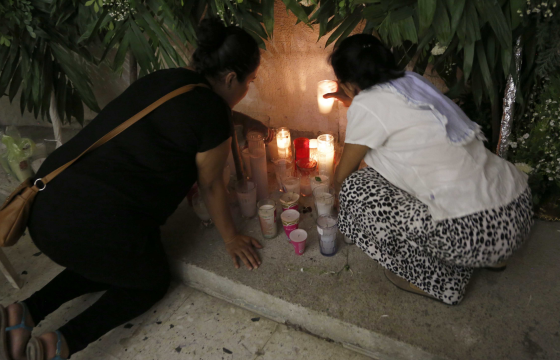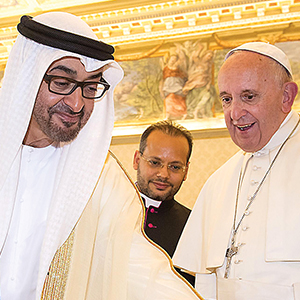World peace talks
Sheikh Mohamed bin Zayed Al Nahyan (above), the Crown Prince of Abu Dhabi and Deputy Supreme Commander of the Armed Forces, met Pope Francis at the Vatican on Thursday last week to discuss world peace. “We are working together on promoting and enabling peace and stability to prevail throughout the world,” Sheikh Mohamed said.
“The United Arab Emirates will spare no effort in working to build the foundations of dialogue and coexistence among different civilisations, cultures, religions and peoples, based on the values of tolerance and openness, and far from any tendencies towards confrontation, extremism, intolerance and violence,” he added.
Bishop Paul Hinder, Vicar Apostolic in the Apostolic Vicariate of Southern Arabia, said he was “overjoyed” by the meeting. “Here was a meeting of two men of different religious and cultural backgrounds, but who share common goals and interests,” he said. “The UAE is an island of peace and tolerance in a region where radical groups are undermining the tradition of peaceful coexistence.”
The Catholic bishops of The Philippines have issued a statement on the death penalty, setting out “ethical guidelines” against proposals to reinstate it, as the country’s war on drugs continues. The bishops appealed to Catholic legislators and judges, steering clear of a direct challenge to President Rodrigo Duterte. The first bill filed in the new congressional term involved a proposal to reinstate the death penalty. Mr Duterte has urged Congress to pass the bill. Many Philippines dioceses have put up “Thou Shall Not Kill’ posters.
In Kenya, a court has ruled that Christian schools may not ban Muslim girls from wearing hijabs as part of their uniforms. A church-run school had banned female pupils from wearing the headscarf, arguing that allowing students to dress differently created discord. The hijab has triggered tensions between the Christians and Muslims in the past, with church-sponsored schools stressing their right to decide what children wear in school as uniform and Muslims seeing church resistance to the hijab as religious discrimination. Earlier this month, three high court judges ruled that education providers must embrace diversity and not discriminate.
Historic church devastated
A fire has ruined much of the famous sixteenth-century church of San Sebastian (above) in the Peruvian city of Cusco. The blaze on 16 September destroyed much of the roof and consumed priceless works from the Cusco School of Catholic art, created by Spanish rulers after the conquest of the Inca Empire in 1534. Two canvases, titled “Martyrdom of San Sebastian”, by the famous Quechua artist Diego Quispe Tito, were destroyed as well as a seventeenth-century sculpture of St Sebastian. The fire also destroyed the church’s altar of gold-gilded cedar wood. The church underwent a US$1.5 million renovation in 2013, including the installation of smoke sensors and emergency lights. The fire was probably caused by a short circuit, according to the authorities. Cusco was the capital of the Inca Empire before Spain’s conquest of Peru and the Machu Picchu ruins lie nearby.
The leaders of the Catholic and Protestant Churches in Germany, Cardinal Reinhard Marx and Bishop Heinrich Bedford-Strohm, have reiterated their intention to celebrate the 2017 Reformation Commemoration as an “ecumenical event.”
The two bishops together presented a 92-page document, “Common Word on the Year 2017,” in Munich on 16 September, setting out their positions. Entitled “Healing Memories – Bearing Witness to Christ,” the document explores both the mutual wounds the two Churches inflicted on each other in the past 500 years and the ecumenical rapprochement that has taken place in recent decades. We have arrived at an “outstanding moment in our communion”, the two leaders say in the preface.
Far fewer churches and chapels in France have been sold off or demolished since the separation of church and state in 1905 than is generally assumed, according to a study by the French bishops’ conference. While church closures can often spark public protests, only 255 churches and parish chapels have been shut and not replaced since 1905, when the state took control of all church property built up to that date and pledged to maintain it.
Over 2,100 churches which were in a poor state of repair or too small – including those damaged in the two world wars – have been replaced with new buildings at public expense, the study added. By contrast, dioceses have built 1,886 churches and chapels since then, the report said.
Meanwhile, France has quietly amended its official oath for new magistrates to drop any possible reference to religion, saying it was “obsolete” to have them swear that they would “religiously” respect the secrecy of their deliberations. The oath, used since the start of the Fifth Republic in 1958, was amended in a little-noticed section of a reform law passed in August.
In the Dominican Republic, Mgr Francisco Ozoria Acosta was installed as the new Archbishop of Santo Domingo in a ceremony on 10 September. He was born in the town of Nagua in the northeast of the island in 1951 and ordained a priest in 1978. The new archbishop has a reputation as someone with a strong pastoral presence. In the past he has said that the Catholic Church has a responsibility towards migrants, particularly Haitians in the Dominican Republic.
Exorcist dies at 91
A charismatic priest who developed an international reputation for his forthright comments on evil and demonic forces, has died at the age of 91. Fr Gabriele Amorth (above), the Chief Exorcist for the Diocese of Rome for over 30 years, claimed that satanic influences had entered the Vatican and that Harry Potter books encouraged children to believe in black magic. He died on Friday night, having been hospitalised for several weeks for various respiratory and circulatory problems. Over the years, Fr Amorth claimed to have performed 70,000 exorcisms. But his comments on battling the devil left some church leaders wary – such as the claim in his memoirs that a number of clerics inside the Vatican were part of evil sects and that Pope Benedict XVI was doing “what he can” to fight them. Recently, he said the Islamic State was under the influence of demonic forces.
22 September 2016, The Tablet
News Briefing: The Church in the World
 Loading ...
Loading ...
Get Instant Access
Subscribe to The Tablet for just £7.99
Subscribe today to take advantage of our introductory offers and enjoy 30 days' access for just £7.99



